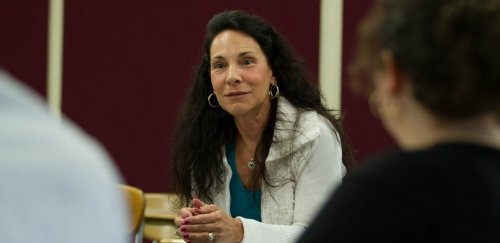Sample Careers
- Writing
- Publishing
- Public relations & marketing
- Arts and nonprofit administration
- Education
- Academic administration
- Journalism
- Law
- Librarianship
- Multimedia content development

At Rhode Island College, graduate programs in English prepare students to succeed as literary professionals, whether as teachers, writers, or scholars. We offer a master’s in English with an optional concentration in creative writing, as well as certificate programs in literature and creative writing. Small class sizes allow students to work closely with their professors and peers in seminars and workshops as they develop projects tailored to their particular interests. Many of our graduates have gone on to pursue a Ph.D. and are now professors, published authors, and leading scholars in their field. A graduate degree in English can open doors for career paths in publishing, editing, administration, or marketing in a variety of corporate, online, and academic settings.
The Certificate of Graduate Study (C.G.S.) in the advanced study of creative writing enables students to expand their knowledge of and proficiency in the crafts of poetry, fiction or creative nonfiction. This 15-credit program does not require a thesis or examination. Courses taken while pursuing the C.G.S. may be applied towards the master’s degree if students are admitted into the master’s program later.
Our graduate programs offer small class sizes and opportunities to work closely with committed faculty who are active teachers, writers, and scholars. The unique one-on-one nature of our programs allows students to advance their skills generally and develop projects of particular interest to them.

This Certificate of Graduate Study (C.G.S.) is a 15-credit program that enables students to pursue the study of literature on an advanced, graduate level. This program does not require a thesis or examination. Courses taken while pursuing the C.G.S. may be applied towards the master’s degree if students are admitted into the master’s program later. The certificate may be particularly useful to high school teachers seeking a credential to teach college-credit English courses.
Our graduate programs offer small class sizes and opportunities to work closely with committed faculty who are active teachers, writers, and scholars. The unique one-on-one nature of our programs allows students to advance their skills generally and develop projects of particular interest to them.

The English Department at Rhode Island College prepares its graduate students to read, write, and think critically about literature and culture on an advanced level. We expose students to a variety of theoretical and pedagogical approaches, and we promote their ability to pursue independent research by presenting current resources and methodologies in the field. By offering a broad range of courses, we allow students to expand their knowledge about literature, theory, and criticism; by working with students individually on directed studies, exams, or theses, we give students the opportunity to explore a subject in depth and to develop expertise in a particular area.
Our graduate programs offer small class sizes and opportunities to work closely with committed faculty who are active teachers, writers, and scholars. The unique one-on-one nature of our programs allows students to advance their skills generally and develop projects of particular interest to them.

The Certificate of Graduate Study (C.G.S.) in historical studies is designed for students who are interested in broadening their historical knowledge. Students interested in pursuing the M.A. in history may start with the C.G.S. program and transition into the M.A. program.
Our program offers both the flexibility and opportunity to concentrate in a particular area. The C.G.S. program also complements the M.A. in history.

This degree program exposes students to the latest research in their area of interest, focusing on recent thematic and research developments. Thus the program is a fitting introduction to advanced work in history, both for working teachers who wish to expand their knowledge and for those considering the pursuit of a doctoral history degree.
Students are given the opportunity to complete courses at times convenient to their schedules. They’re also exposed to faculty with national and international reputations who take pride not only in their research, but also in mentoring young historians in seminar classes. Faculty possess broad expertise in a range of areas and courses are rotated annually so students may work with different faculty.
